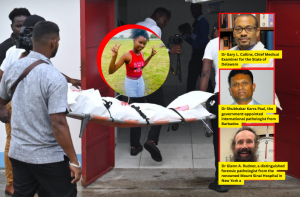–no signs of trauma in second autopsy; body lost forensic value, is compromised, medical examiner contracted by family says
In an explosive revelation, the second autopsy performed on the body of 11-year-old Adriana Younge by a US pathologist hired by the family, has confirmed the findings of the initial post-mortem conducted in Guyana.
Dr. Terry, the Chief Medical Examiner at the Gwinnett County Medical Examiner’s Office in Georgia, conducted the autopsy on Thursday after Adriana’s body was flown out of Georgetown earlier in the week.
Speaking to journalist Travis Chase immediately after completing the procedure, Dr. Terry emphasised that she did not find any evidence of trauma on Adriana’s body, a key observation also recorded by the original autopsy conducted by a team of three internationally recognised pathologists in Guyana.

“There is no trauma that has been overlooked in the first examination. The first autopsy was conducted thoroughly. There were some minor differences in technique, but technically, from what I can see, it was very competently done,” Dr. Terry said.
She stated that her role was essentially to provide quality control on the original post-mortem and verify whether that initial autopsy was properly conducted.
The findings from the first post-mortem were submitted earlier this week to Guyanese investigators and confirmed that Adriana died by drowning.
The first autopsy was conducted at the Georgetown Public Hospital Corporation (GPHC) earlier this month by: Dr Glenn A. Rudner of Mount Sinai Hospital, New York; Dr Shubhakar Karra Paul, a government-appointed pathologist from Barbados; and Dr Gary L. Collins, Chief Medical Examiner for the State of Delaware, who was chosen by Adrianna’s family.
The autopsy found no signs of sexual assault, blunt force trauma, restraint, or other forms of foul play.
Toxicology results also showed no drugs or substances in her system, aside from ethanol levels consistent with post-mortem decomposition.
These results were aligned with a separate investigative review conducted by retired Royal Canadian Mounted Police investigator, Leonard McCoshan, who also concluded there was “no evidence of foul play by persons named or unnamed.”
While affirming that the first autopsy was technically sound, the U.S.-based pathologist, Dr. Carol A. Terry, had recommended a thorough criminal investigation into the matter.
Adriana’s body was found floating in the pool of the Double Day International Hotel.
Family members had raised several concerns, including allegations of sexual assault, forced drowning elsewhere, and even ritualistic activity.
All these claims were investigated and ruled out in the original autopsy and police investigation.
On whether Adriana’s body had lost forensic value due to being embalmed and previously examined, Dr. Terry admitted, “Yes, the examination that I had opportunity to do is compromised… again, it’s a second autopsy.
“So, we have issues of artifacts that are introduced by the first autopsy, we’ve got decomposition that has taken place, and we’ve got embalming.”
Still, she reiterated: “There was no trauma. That’s significant.”
While she did not rule out drowning, she noted that other cause of deaths would have to be ruled out before drowning could be determined as the cause of death.
The Guyana Police Force has said it will be submitting its complete investigative file to the Director of Public Prosecutions (DPP) for legal guidance.
In its statement, the Force had previously acknowledged the concerns raised by Adriana’s family and reiterated its “commitment to transparency and justice.”



.jpg)










